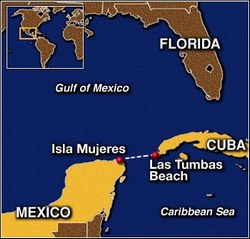USA and Cuba: Common ecosystem
- Submitted by: admin
- Culture and Traditions
- Environment
- History
- international
- Science and Technology
- Society
- United States
- Personalities
- Politics and Government
- 11 / 30 / 2009

The sharks, sea turtles and other miscellaneous underwater creatures that roam the Gulf of Mexico could care less about the U.S. trade embargo against Cuba, or the island’s one-party communist state. So why should such terrestrial concerns get in
the way of marine research?
That appears to be the logic behind a growing partnership between scientists in the U.S., Cuba, and Mexico working on a multinational plan to protect the gulf’s underwater ecosystems.
Similar collaborations exist between the U.S. and Cuba for hurricane tracking and research, but participants said this was the most significant marine science partnership between the countries to date.
The effort is another small but significant example of improving ties between the U.S. and Cuba on matters of mutual concern — in this case a single, shared marine ecosystem. “We know our countries have different administrations and points of view,
but there’s only one atmosphere and one ocean,” said Alberto Vazquez de la Cerda, an oceanographer and retired vice admiral of the Mexican Navy, who hosted two previous meetings for U.S. and Cuba scientists in Mexico. “Mother nature doesn’t care about borders or politics,” he said.
Unlike other parts of the globe where large stretches of open international waters can make enforcement difficult, the Gulf of Mexico is divided almost entirely among the three countries, improving the chances for protection, scientists said.
Politics remain an obstacle to the partnership. Cuban authorities have traditionally been wary of U.S. scientists seeking to visit remote areas of the island for research purposes out of concern over espionage. And the U.S. government has routinely
denied visas for Cuban marine researchers seeking to travel to the U.S., though the Obama administration has shown more flexibility lately in granting academic and research visas, according to conference participants.
“Because of the political relationship between our countries, it takes some stamina to work here,” said David Guggenheim, the marine scientist who led the U.S. delegation, speaking at Cuba’s National Aquarium in Havana.
A comprehensive effort to study marine ecosystems in the gulf and advocate for their protection is likely to cost tens of millions of dollars,this is going to require the support of governments, and multiple government agencies."
Source: www.globalpost.com
Comments